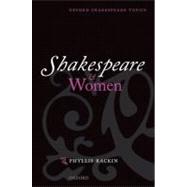Shakespeare And Women
, by Rackin, Phyllis- ISBN: 9780198186946 | 0198186940
- Cover: Paperback
- Copyright: 8/4/2005
Shakespeare and Women situates Shakespeare's female characters in multiple historical contexts, ranging from the early modern England in which they originated to the contemporary Western world in which our own encounters with them are staged. In so doing, this book seeks to challenge currentlyprevalent views of Shakespeare's women-both the women he depicted in his plays and the women he encountered in the world he inhabited. Chapter 1, 'A Usable History', analyses the implications and consequences of the emphasis on patriarchal power, male misogyny, and women's oppression that has dominated recent feminist Shakespeare scholarship, while subsequent chapters propose alternative models for feminist analysis. Chapter 2,'The Place(s) of Women in Shakespeare's World', emphasizes the frequently overlooked kinds of social, political, and economic agency exercised by the women Shakespeare would have known in both Stratford and London. Chapter 3, 'Our Canon, Ourselves', addresses the implications of the modernpopularity of plays such as The Taming of the Shrew which seem to endorse women's subjugation, arguing that the plays-and the aspects of those plays-that we have chosen to emphasize tell us more about our own assumptions than about the beliefs that informed the responses of Shakespeare's firstaudiences. Chapter 4, 'Boys will be Girls', explores the consequences for women of the use of male actors to play women's roles. Chapter 5, 'The Lady's Reeking Breath', turns to the sonnets, the texts that seem most resistant to feminist appropriation, to argue that Shakespeare's rewriting of theidealized Petrarchan lady anticipates modern feminist critiques of the essential misogyny of the Petrarchan tradition. The final chapter, 'Shakespeare's Timeless Women', surveys the implication of Shakespeare's female characters in the process of historical change, as they have been repeatedlyupdated to conform to changing conceptions of women's nature and women's social roles, serving in ever-changing guises as models of an unchanging, universal female nature.







